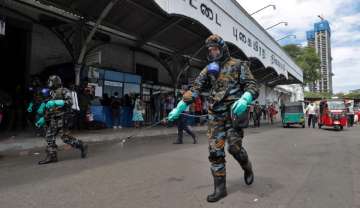Like Tablighi Jamaat in India, Sri Lanka’s coronavirus fight also threatened by a religious gathering
"The Sri Lankan government is now viewing the influx of the evangelist missionaries as a threat,” says Dr Maravanpulavu Sachithananthan, a scholar and founder of Siva Senai, a group advocating for rights of Sri Lanka’s Tamil Hindus

Organising religious congregations at a time when the governments across the world are busy in combatting the spread of the coronavirus have emerged as a grave impediment against the global effort to check the further spread of the virus. While in India, the Tablighi Jamaat gathering in New Delhi last month emerged as a coronavirus hotspot, with almost 30 per cent of the total cases in the country having some connection or the other, a similar religious congregation in Sri Lanka became an eyesore for authorities’ fight against the virus.
On March 15, the lead pastor of the Philadelphia Missionary Church in Jaffna, gave a brazen call to his followers in the Northern Province. Reverend Paul Satkunarajah declared at the time that his mass was being convened to mitigate the spread of the virus. The Sri Lankan authorities later revealed that 240 people heeded to the missionary movement’s call and attended the gathering.
The reverend reportedly hugged and ‘blessed’ all those who attended the congregation. It later emerged that he himself had tested positive for the virus, following which he fled to Switzerland. The 240 people who attended the gathering were ordered into quarantine, with seven of them found to be infected with the virus.
“The remaining congregants, earlier found to be negative, have now been infected even in isolation. "The Sri Lankan government is now viewing the influx of the evangelist missionaries as a threat,” says Dr Maravanpulavu Sachithananthan, a scholar and founder of Siva Senai, a group advocating for rights of Sri Lanka’s Tamil Hindus.
Sachithananthan, a former advisor to the United Nations, spoke to India TV Digital, from his home in Jaffna.
Q. How is the Sri Lankan government’s response towards coronavirus, particularly in Jaffna, Northern Province, where you are located? Are the locals satisfied with the preventive and economic measures taken by your government?
A. The Sri Lankan government has been very efficient. There are going by the scientific evidence being presented by the healthcare workers and trained professionals. All the infected patients, or suspects, are being given equal attention. There is no hidden agenda or discrimination when it comes to treating patients.
Q. Two hundred and forty persons are said to have attended the Philadelphia Church Gathering in Jaffna on March 15. The lead pastor, who is reported to have hugged all the attendees, tested positive and made a dash for Switzerland. What are the implications it has had on Sri Lanka’s battle against coronavirus?
A. Many villages in all the five districts of the Northern Province from where these participants came have now been closed by local officials. Many of the congregants are under quarantine. The area around the Palaly Military Base (the largest on the Jaffna Peninsula) has a seclusion area for the Philadelphia Church inmates. Seven people out of those who attended the gathering were found to be infected with the coronavirus, with one of them succumbing to the virus. The remaining congregants, earlier found to be negative, have now been infected even in isolation. The Sri Lankan government is now viewing the influx of the evangelist missionaries as a threat.
Q. In India, the government is invoking the National Security Act against the leader of Tablighi Jamaat, behind the religious congregation in New Delhi that has become the hotspot of coronavirus cases in India. What action has the Sri Lankan government taken so far against the religious leaders of the Philadelphia Church gathering?
A. So far, we don’t have any inputs of any legal action being taken against them.
Q. Now, leading voices from the opposition in Sri Lanka, including leaders from the Tamil National Alliance (TNA) are calling for reconvening the parliamentary session. They say that a parliamentary session is necessary to help the government with the powers necessary to combat the pandemic. What are your thoughts on that?
A. Any gathering, be it of any sort, is detrimental to the larger effort against the spread of the coronavirus. The Sri Lankan Hindu community leaders as well as Buddhist leaders are on the same page on this. We want coronavirus to die off through seclusion and social distancing. Reconvening the Parliament involves not only the 225 members but also around 2,000 persons who are part of the supporting staff. It will be a nightmare.
Q. A total of 166 cases have been reported from Sri Lanka to date, resulting in four deaths. The Sri Lankan government says that it wants to keep the total count below 300 in April. How realistic is the expectation?
A. Fortunately, the growth of the number of cases is not exponential in Sri Lanka, unlike in some other parts of the world. There have confirmed reports of five people having succumbed to the virus so far, even though some reports in the local media have claimed that the toll could be seven. The authorities must be appreciated for accepting medical expertise, above all the other considerations. I would like to condemn here the stand taken by Amnesty International’s local affiliate, which has alleged discrimination in the cremation of a Muslim victim who had passed away due to the virus. Sri Lankan realities require medical guidance and Amnesty’s outdated ideas are not the need of the hour.
Also read: 7 FAKE coronavirus stories you must NOT fall for